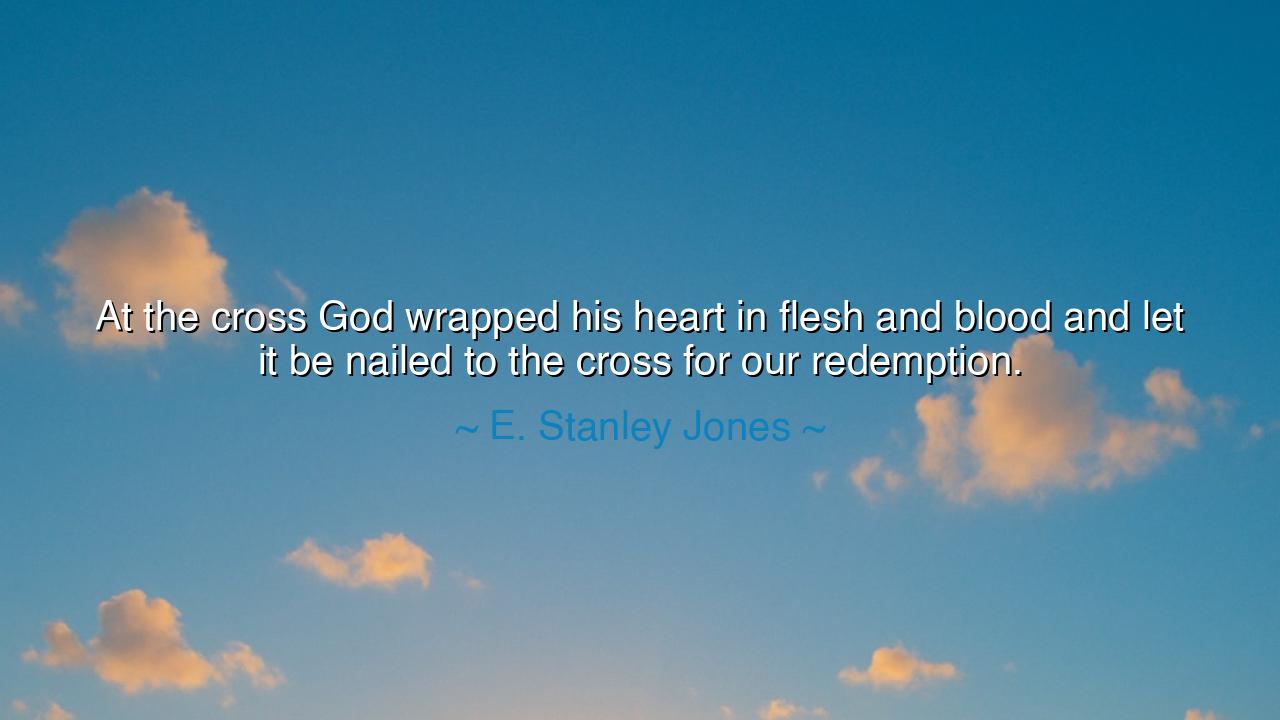
At the cross God wrapped his heart in flesh and blood and let it
At the cross God wrapped his heart in flesh and blood and let it be nailed to the cross for our redemption.






“At the cross God wrapped His heart in flesh and blood and let it be nailed to the cross for our redemption.” — these words by E. Stanley Jones, the missionary mystic and evangelist, resound like the toll of a sacred bell through the centuries of human longing. In this one sentence lies the mystery of divine love — that the infinite became finite, that the Creator took on the form of the created, and that the heart of God was laid bare upon the beams of the cross. It is a vision so profound that it has shaken kings and comforted the broken, for here the eternal stoops into time, and the Almighty becomes vulnerable for the sake of the unworthy.
The origin of this quote comes from Jones’s writings and sermons on the meaning of the Incarnation and the redemption of humanity. A man who spent his life bringing the message of Christ across cultures — especially in India, where he dialogued with both Hindu and Muslim thinkers — Jones sought to express Christianity not as a mere religion, but as the living revelation of divine love in human form. To him, the cross was not just an event in history; it was the heart of God exposed before the world, pulsing with mercy. In saying that “God wrapped His heart in flesh and blood,” Jones gives poetic form to the mystery of the Incarnation — that the divine took on humanity in Jesus, not to reign in splendor, but to suffer and redeem.
To the ancients, the thought that the immortal could die was unthinkable. The gods of myth were distant, capricious, untouchable. But in the gospel, God does the unthinkable: He takes upon Himself the pain of His own creation. The cross becomes the place where divine love is tested and proven true. There, omnipotence allows itself to be broken, not from weakness, but from compassion. The nails that pierced Christ’s hands were not stronger than His will — they were instruments through which love expressed its fullest power. For in surrendering His life, God was not defeated; He was revealing that love’s strength is greater than death’s dominion.
In human history, this truth has ignited the courage of countless souls. Consider St. Francis of Assisi, the son of wealth who laid down his riches to live among the poor. When he gazed upon the crucifix, he saw not sorrow, but glory in humility. He realized that if God Himself had stooped to suffer for love, then no act of service was beneath a follower of Christ. Inspired by that vision, Francis rebuilt a broken church — not just with stone, but with compassion. His life became a living echo of Jones’s words: the heart of God made visible in flesh and deed. The cross, to Francis as to Jones, was not a symbol of defeat, but the blueprint of divine transformation.
Jones’s imagery — God’s heart nailed to the cross — speaks also to the intimacy of divine empathy. When we suffer, we often cry out, “Where is God?” But Jones reminds us: God is not distant; He has entered suffering itself. In the cross, the Creator joins His creation in pain, saying, “You are not alone.” The redemption spoken of here is not a transaction of guilt for payment — it is the restoration of relationship, the mending of what was torn. It tells us that love does not hover above the world’s agony; it descends into it, heals it from within, and rises again to lead the way toward hope.
In this light, the cross is not simply the end of Jesus’s life, but the beginning of all renewal. It is where hate meets forgiveness, where sin meets mercy, and where despair meets resurrection. When Jones says that God wrapped His heart in flesh and blood, he is reminding us that love is never abstract. True love costs. It bleeds, it gives, it bears burdens not its own. The cross is the eternal sign that God’s love is not spoken, but demonstrated — that salvation was not achieved by command, but by compassion carried to its ultimate expression.
So, my child, take this wisdom deeply into your soul: the measure of divine love is found not in comfort, but in sacrifice. If God Himself was willing to enter suffering for the sake of love, then we too must be willing to bear the weight of love in our lives. Forgive when it hurts. Serve when it costs. Love when the world tells you to protect yourself. In doing so, you mirror the very heart of God. For every act of mercy, every moment of grace, every kindness freely given — these are the small crucifixions through which the redemption of the world continues.
And remember always the truth behind Jones’s words: that the heart of God still beats for His creation. It beats in the cry of the broken, in the courage of the just, in the forgiveness of the wounded. It beats in you when you choose love over anger, faith over fear, hope over despair. At the cross, love was not defeated — it was revealed. And from that revelation flows all that is good, all that is holy, and all that is worth living for.






AAdministratorAdministrator
Welcome, honored guests. Please leave a comment, we will respond soon